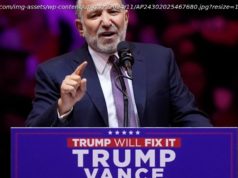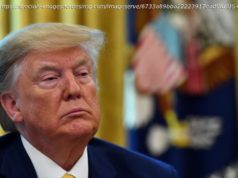Businesspeople want tax cuts and deregulation. They don’t expect help from the Oval Office.
One by one, some of the most important people in corporate America lined up on Wednesday to criticize the president of the United States. Though many of them didn’t utter Donald Trump’s name, they didn’t need to. Everyone knew they were talking about Trump’s repugnant “both-sides-are-bad” response to the violence in Charlottesville, Virginia, this past weekend.
“What we saw there was domestic terrorism, ” said Laurence Fink, the chief executive of BlackRock Inc., the giant investment management company, in a memo to employees that was quickly leaked to the press. “It cannot be accepted, and it cannot be tolerated.”
Jamie Dimon, the CEO of JPMorgan Chase & Co., made similar points in his memo to employees: “There is no room for equivocation here: the evil on display by these perpetrators of hate should be condemned and has no place in a country that draws strength from our diversity and humanity.”
So did Denise Morrison, who heads Campbell Soup Co. and said, “Racism and murder are unequivocally reprehensible and are not morally equivalent to anything else that happened in Charlottesville.” She added that Trump should have been “unambiguous on that point.”
Those declarations arrived in the afternoon. Earlier, the members of Trump’s Strategy and Policy Forum–that’s the one chaired by Stephen Schwarzman of Blackstone Group LP, and that included such business luminaries as Fink, Dimon and Indra Nooyi of PepsiCo Inc.–had decided to disband in the wake of Trump’s Tuesday afternoon press conference. Never one to be one-upped, Trump beat the council to the punch by tweeting that he was dissolving it.
He also got rid of his second business advisory board, the American Manufacturing Council. That’s the one that had included Merck’s Kenneth Frazier, whose decision to step down on Monday triggered an exodus of CEOs. By the time Trump eliminated it, 12 of its 28 members had either left or had announced they were leaving, including Jeff Immelt of General Electric Co. and Alex Gorsky of Johnson & Johnson. It, too, would have been disbanded by the members if Trump hadn’t dissolved it first.
It was an extraordinary moment in American politics. The brightest stars in corporate America, most of whom leaned Republican and had once seen in Trump a chance to enact all sorts of profit-boosting measures, were concluding that they were better off walking away.
Tension between business leaders and presidents is hardly new. Wall Street disliked President Barack Obama, partly because he pushed for the Dodd-Frank financial regulation act, but more because he didn’t treat them with the deference they thought they deserved. (“My administration is the only thing between you and the pitchforks, ” he told bankers during the financial crisis.) President Jimmy Carter’s inability to halt inflation or hold down interest rates created enormous dissatisfaction.
And of course Franklin Delano Roosevelt was loathed by big business, which saw the New Deal as shackling free enterprise. One anti-Roosevelt effort, a propaganda organization called the American Liberty League, was funded in part by the likes of Alfred Sloan of General Motors and the DuPont family. They were the Jeff Immelt and Jamie Dimon of that era.
But what is happening now between Trump and corporate America is different. Businessmen turned against Roosevelt because they feared him, as they had good reason to do. He knew how to pull the levers of power–how to create a Securities and Exchange Commission, for instance, and push for the passage of the Glass-Steagall Act, which separated commercial banking from investment banking.
When Trump started running for president, the business community had a leg up in understanding him. Some had done deals with him, or had attended galas that he also attended, or had shot a round of golf with him at one of his resorts. They knew he was crude, narcissistic and only out for himself. And having watched the collapse of his casino business in the early 1990s, few had much respect for his business skills.
But they also thought that having a businessman in the White House would be, well, good for business. Infrastructure to build! Tax cuts! Dodd-Frank repeal! Regulations eliminated! They also learned that Trump was malleable. After hammering the pharmaceutical industry over high drug prices, Trump held an early meeting with a group of pharma CEOs. He came out of the meeting with a statement that was not nearly as harsh and that complimented the industry for its “extraordinary results for our country.”
So of course most CEOs said yes when they were asked to join one of his councils. Trump pulled out of the Paris climate accords, and most of them stayed. (Disney’s Robert Iger and Elon Musk were exceptions.) Trump fired James Comey from the Federal Bureau of Investigation, and they stayed. Trump made an absurdly partisan speech to the Boy Scouts and they stayed. Even once they realized the council meetings were a waste of time, they stayed. Many of them took the view that it was a good idea to keep a “seat at the table.”
So what changed? Yes, Trump’s incendiary press conference on Tuesday made most corporate executives uncomfortable. But if they still felt that Trump had the power to help get their agenda through Congress, most of them probably would have stuck with him.
But they’ve come to realize that Trump is not going to be of any use to them. He is never going to get anything through Congress, which now shrugs when he demands action. His one legislative push, repeal and replacement of his predecessor’s signature health-care program, was a political disaster that has largely eliminated the chances for, say, an infrastructure plan. (Indeed, the S&P 500 Construction and Engineering Index is down 20 percent since Trump became president.) His idea of lobbying is to send out bullying tweets. He couldn’ t even intimidate his own attorney general, Jeff Sessions, who showed not long ago that Trump’s blustery tweets have no consequences if you ignore them.






